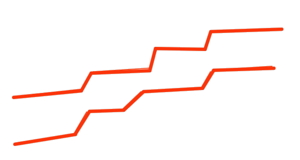Differentiation
Feb. 22nd, 2023 03:15 pmYou don't need anything from me in order to be different from me. You can simply be you, and leave me to either notice or not notice, care or not care.
But if you feel the need to explain that you aren't ashamed of this difference, that you don't consider this difference an inferiority, and that you would not wish this difference away even if you could, then you may feel the need to tell me that not only are you different from me, you are glad of it. That you would not want to be like me.
Interestingly, one experience that might provoke you into doing that is me telling you that am glad I am not like you.
"It's not the same", a primal part of me rushes to shout. "There were always a whole bunch of you, defining yourselves as normal, and singling me out as the one that the rest of you were glad you didn't resemble."
That's true enough, but put a pin in it for a moment. (I won't forget that aspect of things, I assure you. I just want to focus on something else today).
Is it only sheer weight of numbers that makes our situations different? Is your reaction to my difference otherwise equivalent to my reaction to yours?
There, too, I tend to rush forward to say that you folks who are in the majority are fearful and easily threatened by difference, your defensiveness making it get all hostile. And that, too, makes our situation different.
But I need to be honest. I disapproved of you, growing up. I felt superior to you. I definitely thought you folks were doing it all wrong. Your hostility may have made me emphasize how much I didn't want to be like you, but I was already partway there before I fully noticed that. And if I'd been a lot more plural -- that is, if there had been a whole bunch of people like me, people I could compare notes with and discuss you folks and your behaviors and antics and your way of being in the world -- we might have solidifed each others' contempt for how you are. For how wrong you are.
Oh, is this news to you? It really never occurred to you that marginalized folks like me were rolling our eyes at you not just for your unfair and oppressive practices, and not just for going around acting like your identity and personality and behavior are good and praiseworthy and ours is not, ...but that we find your difference from us to be creepy and repulsive and pathetic and disgusting? Okay, we mostly don't give voice to that because we mostly had a lot more reason to outgrown that kind of provincial narrowness. Unlike you, we were in a situation that prompted us, at least most of us, to think a lot about fairness and equality and being careful and thoughtful about passing judgment on folks and their perceived differences. About hating on difference for its own sake.
Well, true confession time, then. I have a better understanding of your hostile xenophobia hatred than I tend to let on. That. Does. NOT. Make it. Okay. If you try to draw that conclusion, I'm going to stick you with something sharper and meaner than a pin.
But what it does do is encourage us to set aside the notion that all such oppressive and hateful behavior originates in a desire to be oppressive and hateful, which would leave you and your majoritarian kind utterly incomprehensible to us who have been shoved to the social margins. It actually opens the door on the possibility of forgiveness. If there's understanding, if you get it, if things click into place for you and you see us and see how wrong this adversarial difference-hating is, then yeah, for me at any rate forgiveness is in the works.
—————
My first book, GenderQueer: A Story From a Different Closet, is published by Sunstone Press. It is available on Amazon and Barnes & Noble in paperback, hardback, and ebook, and as ebook only from Apple, Kobo, and directly from Sunstone Press themselves.
My second book, That Guy in Our Women's Studies Class, has also now been published by Sunstone Press. It's a sequel to GenderQueer. It is available on Amazon and on Barnes & Noble in paperback and ebook, and as ebook only from Apple, Kobo, and directly from Sunstone Press themselves.
My third book is deep in second draft, and I'm seeking more beta readers for feedback. It is provisionally titled Within the Box and is set in a psychiatric/rehab facility and is focused on self-determination and identity. Chronologically, it fits between the events in GenderQueer and those described in Guy in Women's Studies; unlike the other two, it is narrowly focused on events in a one-month timeframe and is more of a suspense thriller, although like the other two is also a nonfiction memoir.Contact me if you're interested.
Links to published reviews and comments are listed on my Home Page, for both published books.
———————
This DreamWidth blog is echoed on LiveJournal and WordPress. Please friend/link me from any of those environments on which you have an account.
————————
Index of all Blog Posts
But if you feel the need to explain that you aren't ashamed of this difference, that you don't consider this difference an inferiority, and that you would not wish this difference away even if you could, then you may feel the need to tell me that not only are you different from me, you are glad of it. That you would not want to be like me.
Interestingly, one experience that might provoke you into doing that is me telling you that am glad I am not like you.
"It's not the same", a primal part of me rushes to shout. "There were always a whole bunch of you, defining yourselves as normal, and singling me out as the one that the rest of you were glad you didn't resemble."
That's true enough, but put a pin in it for a moment. (I won't forget that aspect of things, I assure you. I just want to focus on something else today).
Is it only sheer weight of numbers that makes our situations different? Is your reaction to my difference otherwise equivalent to my reaction to yours?
There, too, I tend to rush forward to say that you folks who are in the majority are fearful and easily threatened by difference, your defensiveness making it get all hostile. And that, too, makes our situation different.
But I need to be honest. I disapproved of you, growing up. I felt superior to you. I definitely thought you folks were doing it all wrong. Your hostility may have made me emphasize how much I didn't want to be like you, but I was already partway there before I fully noticed that. And if I'd been a lot more plural -- that is, if there had been a whole bunch of people like me, people I could compare notes with and discuss you folks and your behaviors and antics and your way of being in the world -- we might have solidifed each others' contempt for how you are. For how wrong you are.
Oh, is this news to you? It really never occurred to you that marginalized folks like me were rolling our eyes at you not just for your unfair and oppressive practices, and not just for going around acting like your identity and personality and behavior are good and praiseworthy and ours is not, ...but that we find your difference from us to be creepy and repulsive and pathetic and disgusting? Okay, we mostly don't give voice to that because we mostly had a lot more reason to outgrown that kind of provincial narrowness. Unlike you, we were in a situation that prompted us, at least most of us, to think a lot about fairness and equality and being careful and thoughtful about passing judgment on folks and their perceived differences. About hating on difference for its own sake.
Well, true confession time, then. I have a better understanding of your hostile xenophobia hatred than I tend to let on. That. Does. NOT. Make it. Okay. If you try to draw that conclusion, I'm going to stick you with something sharper and meaner than a pin.
But what it does do is encourage us to set aside the notion that all such oppressive and hateful behavior originates in a desire to be oppressive and hateful, which would leave you and your majoritarian kind utterly incomprehensible to us who have been shoved to the social margins. It actually opens the door on the possibility of forgiveness. If there's understanding, if you get it, if things click into place for you and you see us and see how wrong this adversarial difference-hating is, then yeah, for me at any rate forgiveness is in the works.
—————
My first book, GenderQueer: A Story From a Different Closet, is published by Sunstone Press. It is available on Amazon and Barnes & Noble in paperback, hardback, and ebook, and as ebook only from Apple, Kobo, and directly from Sunstone Press themselves.
My second book, That Guy in Our Women's Studies Class, has also now been published by Sunstone Press. It's a sequel to GenderQueer. It is available on Amazon and on Barnes & Noble in paperback and ebook, and as ebook only from Apple, Kobo, and directly from Sunstone Press themselves.
My third book is deep in second draft, and I'm seeking more beta readers for feedback. It is provisionally titled Within the Box and is set in a psychiatric/rehab facility and is focused on self-determination and identity. Chronologically, it fits between the events in GenderQueer and those described in Guy in Women's Studies; unlike the other two, it is narrowly focused on events in a one-month timeframe and is more of a suspense thriller, although like the other two is also a nonfiction memoir.Contact me if you're interested.
Links to published reviews and comments are listed on my Home Page, for both published books.
———————
This DreamWidth blog is echoed on LiveJournal and WordPress. Please friend/link me from any of those environments on which you have an account.
————————
Index of all Blog Posts



